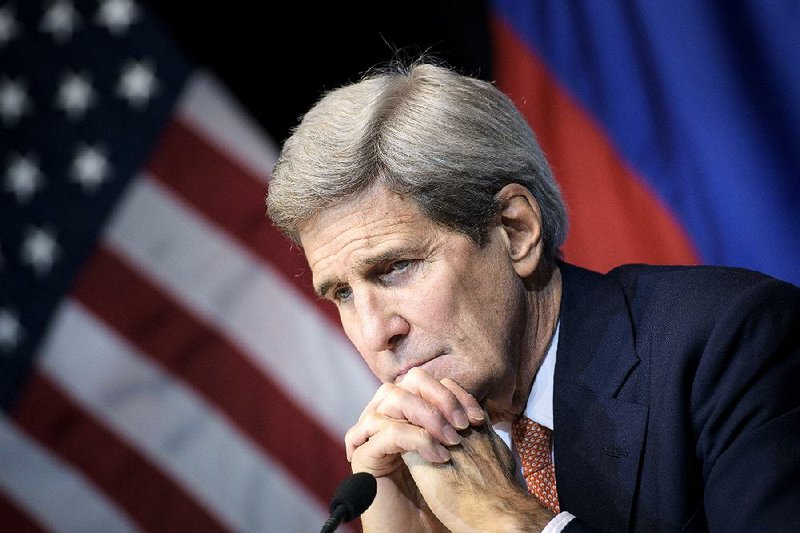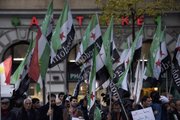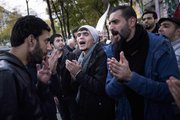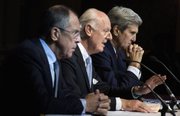WASHINGTON -- A small number of U.S. special operations forces will be sent to northern Syria to work with local troops in the fight against Islamic State militants, the White House announced Friday, marking the first time Americans will be deployed openly on the ground in the country.
RELATED
http://www.arkansas…">U.S. pledges nearly $100 million to support Syrian opposition
But administration officials emphasized that President Barack Obama saw the military efforts as supporting Secretary of State John Kerry's push for a diplomatic and political settlement to the Syrian war through talks in Vienna.
"The president has been quite clear that there is no military solution" to the war in Syria, said Josh Earnest, the White House spokesman. "There is a political one."
The U.S., Russia, Iran and more than a dozen other nations ended two days of talks in the Austrian capital by agreeing Friday to begin a new peace effort involving Syria's government and opposition groups. But the foreign ministers in attendance gave vague details on how Syrian President Bashar Assad would be involved in the country's transition, a key point of dispute among the 17 nations represented at the talks.
On the U.S. deployment, Earnest said Obama ordered that fewer than 50 commandos be sent to help coalition forces coordinate with local troops.
Earnest insisted their role should not be described as a "combat mission," saying the troops would train, advise and assist local forces in an intensification of the U.S. effort against the Islamic State extremist group. He acknowledged, however, that the forces would be taking risks in a dangerous part of the world, where the U.S. also is conducting airstrikes.
"There's no denying the serious risk they will be facing," Earnest said, but "they are not in a combat mission."
"I certainly wouldn't underestimate the capability and capacity of our U.S. Special Operations forces to be an important force multiplier," he added. "The president does expect that they can have an impact in intensifying our strategy for building local forces inside Syria for taking the fight to ISIL in their own territory."
Officials said the U.S. troops would go into Syria over the next few weeks and likely spend less than two months there at a time. A senior defense official did not rule out adjusting or expanding the U.S. effort as conditions in Syria change.
U.S. troops have been on the ground in Syria before, Earnest said, noting a rescue mission more than a year ago and a more recent raid. Officials said those types of unilateral raids could still happen.
Although the number of troops is small, it marks an escalation of U.S. involvement in the fight against the Islamic State, which controls a large part of northern Syria and has its self-proclaimed capital in the Syrian city of Raqqa.
The move comes after weeks of deliberation on how to revive the struggling effort in Syria and the failed training and equipping mission there, and it follows a visit to the region last week by Marine Gen. Joseph Dunford, the new chairman of the Joint Chiefs of Staff.
One senior official said that a first group of forces -- possibly a couple of dozen -- will go soon to assess the situation and determine which groups on the ground the U.S. can best work with, including moderate Kurdish and Arab fighters. More special operations forces will follow once the U.S. better determines what the needs are.
The U.S. special operations forces will all arrive from the United States and will advise and assist the Syrian rebels from headquarters in Syria. They won't move to the front lines, go into battle with those troops or be used to call in airstrikes into Syria. Officials said the U.S. forces will help coordinate operations, planning and logistics.
Other steps were outlined earlier this week by Dunford and by Defense Secretary Ashton Carter. They said the United States will provide more equipment to groups fighting the Islamic State in Syria and increase efforts to help Iraq retake Ramadi.
After the White House's announcement, Carter said the decision to send U.S. forces to Syria is unlikely to be the last significant adjustment to the fight against the Islamic State.
"We are going to continue to innovate to build up what works," he told reporters flying with him to Fort Wainwright in Fairbanks, Alaska, on the first leg of a nine-day trip to the Asia-Pacific region.
Asked whether the use of forces in Syria was a model that would be adopted in Iraq, Carter said the U.S. "will continue to consider" this and other ways to achieve better results against the militants, who also control large parts of Iraq.
Carter said the U.S. forces in northern Syria will be in an area where Russian warplanes are not bombing, so it would not be necessary to talk to the Russians about steering clear. The U.S. and Russia recently signed a memorandum of understanding to avoid unintended conflicts between their warplanes, which are operating separately in the skies over Syria.
Carter declined to be specific about where the U.S. troops will operate in northern Syria but said they will be in territory controlled by Syrian Kurds.
The U.S. will also be sending additional aircraft, including A-10 Warthog planes and about a dozen F-15 fighter jets, to the Incirlik air base in Turkey, likely repositioning them from other spots in the region. The U.S. recently dropped 50 tons of ammunition to Arab groups fighting the Islamic State, and officials said more ammunition and possibly small firearms could be provided over time.
As part of the latest plan, the U.S. is also looking at ways to beef up its support for Iraqi forces battling the Islamic State, including additional equipment and training to counter roadside bombs and vehicle-borne explosive devices. Obama spoke by telephone Friday with Prime Minister Haider al-Abadi of Iraq to discuss the campaign against the Islamic State there and to encourage Iraqi efforts to retake the city of Ramadi.
Obama also ordered more military assistance to Jordan and Lebanon.
A senior administration official said the U.S. has made good progress in Iraq and Syria when working with effective partners on the ground who can regain territory lost to the Islamic State. So the U.S. is moving away from failed approaches, such as the effort to train Syrian rebels outside the country and send them back into Syria.
The officials were not authorized to discuss the matter publicly, so they spoke on condition of anonymity.
Two-pronged approach
At the Vienna talks, the peace plan was hashed out among governments fighting directly or by proxy on opposing sides in a civil war that since 2011 has killed more than 250,000 people, uprooted 11 million from their homes, led to the emergence of the Islamic State and sparked a refugee crisis throughout Europe.
The group also called for the United Nations to convene talks with the Syrian government and opposition on a political process that could lead to a cease-fire.
"Four-and-a-half years of war, we all believe, has been far too long," Kerry told reporters.
Kerry said the U.S. was intensifying a "two-pronged" effort. Diplomatically, it wants to see peace between the government and rebels as quickly as possible. Militarily, it is determined to defeat the Islamic State.
"We are intensifying our counter-Daesh campaign and we are intensifying our diplomatic efforts in order to end the conflict, and we believe these steps are mutually reinforcing," Kerry said, employing an Arabic acronym for the Islamic State.
Although Kerry said the U.S. and its allies haven't changed their position that Assad must go, Russian Foreign Minister Sergey Lavrov said there's no agreement on the Syrian president's future.
"I did not say that Assad has to go or that Assad has to stay," Lavrov said at the news conference with Kerry and the U.N.'s special envoy to Syria, Staffan de Mistura.
For Washington, a new, U.N.-led process reflects a realization that stopping the bloodshed ought to be the top priority, even if that means relegating its longstanding demand for Assad to step aside so that a peaceful, secular and more inclusive Syria can be established.
Kerry said the foreign ministers present in Austria's capital all vowed to maintain Syria's institutions, to protect the rights of all its citizens, to assure humanitarian access and to strive to defeat the Islamic State. He said the process should lead to a new constitution for Syria and internationally supervised elections, as well as an end to violence between Assad's military and rebels so that the world community can focus on the counterterrorism challenge.
But no agreement was reached on Assad, whose future lies at the center of the conflict.
Obama demanded only months into the fighting that Assad leave power. Russia resisted the push by blocking attempts at the U.N. to pressure the Syrian leader and by insisting that any new government be established only by mutual consent of both the government and the opposition. That essentially would give Assad veto power over his would-be replacements.
Underscoring the continued violence, the Syrian opposition reported that a government missile barrage killed more than 40 in a Damascus suburb as diplomats were meeting in Vienna.
In the Austrian capital, officials described tense talks, particularly as regional rivals Iran and Saudi Arabia took turns lambasting the the other's policies toward Syria. Iran has actively fought on the ground alongside Assad's forces and the Iranian proxy militia, Hezbollah. Saudi Arabia has been among the main providers of military assistance to the rebels.
Kerry and Lavrov both acknowledged their continued differences, particularly on Assad, while playing up their ability to join for the ultimate good of Syria.
No one mentioned concrete timetables.
Officials said the 17 governments in attendance had been considering a plan that would establish a cease-fire within four to six months, followed by the formation of a transition government featuring both Assad and opposition members. Conscious of the deep divide over Assad's fate, they left undefined how long Assad could remain in power under that transition. The officials weren't authorized to speak publicly on the matter and demanded anonymity.
Kerry and Lavrov said another round of Syria talks would occur within two weeks.
Information for this article was contributed by Vivian Salama, Lolita C. Baldor, Connie Cass, Bradley Klapper, George Jahn and Robert Burns of The Associated Press; by Peter Baker and Helene Cooper of The New York Times; and by Justin Sink, Tony Capaccio, Nicole Gaouette, Angela Greiling Keane and Zoltan Simon of Bloomberg News.
A Section on 10/31/2015




